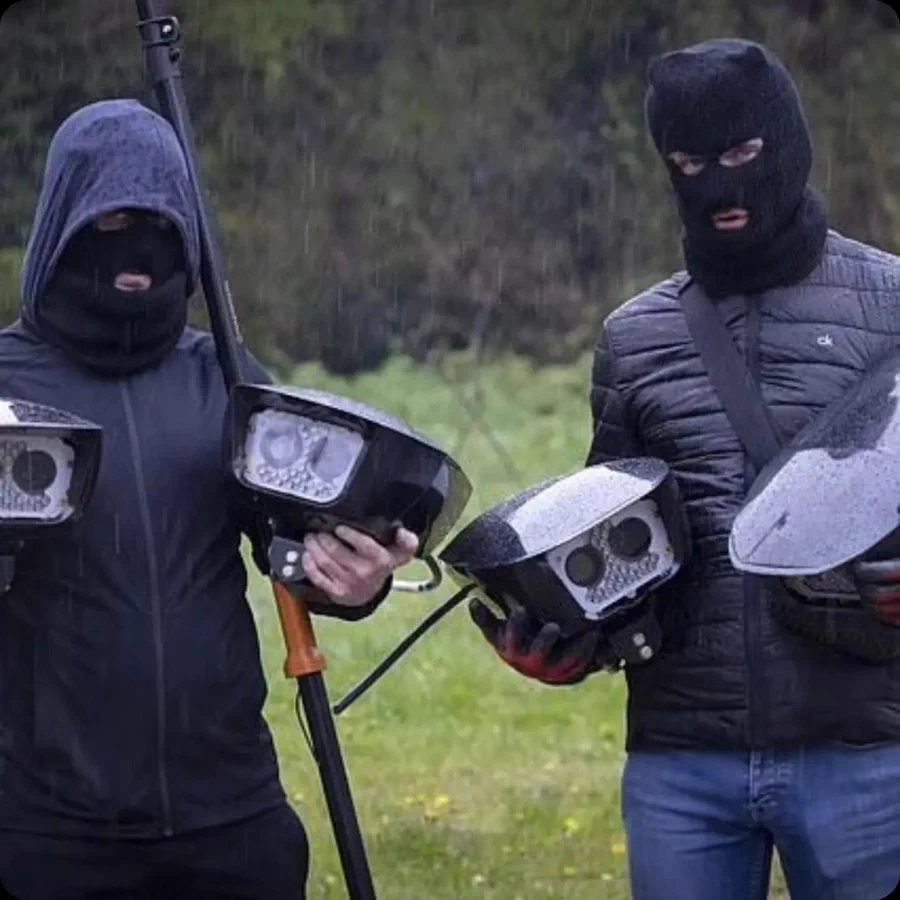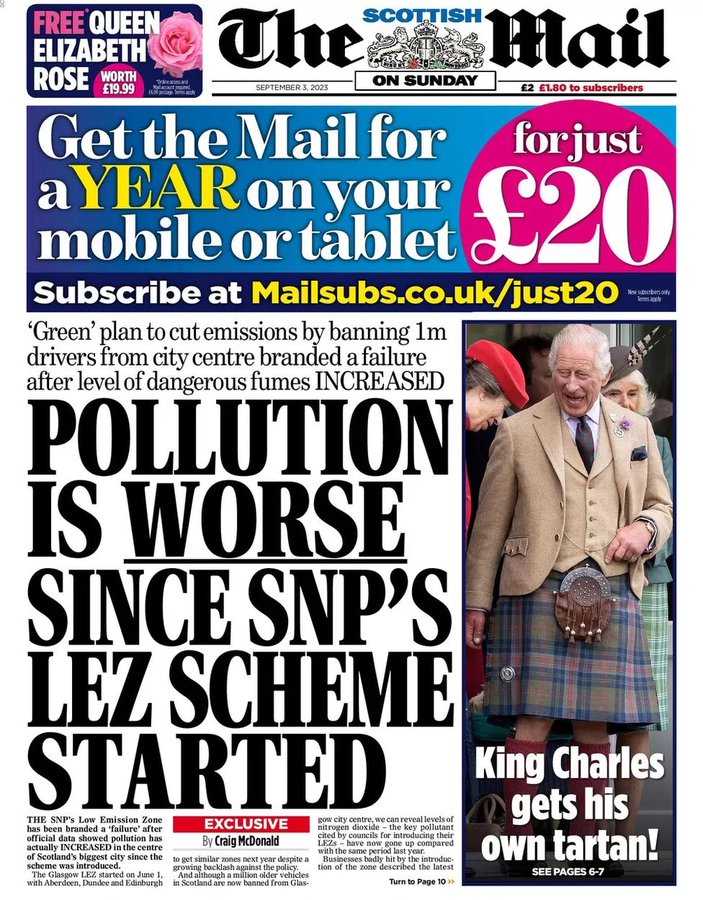The Blade Runners

If you want a snapshot at just how crazy this society is, and just how polluted English political culture is, you’d do no better than to study the new phenomenon of the ‘Blade Runners’.
The war on the environment has a new champion, masked vigilantes the so-called “blade runners”, who have been disabling Ulez cameras around London. Bizarrely for the party of law and order, Iain Duncan Smith, seemed to support the ‘activists’ when he was quoted last week in the Daily Mail saying he was “happy” for constituents to cement up cameras or put plastic bags over them, “because they are facing an imposition no one wants”.
I mean that’s an invitation for civil disobedience everywhere, thanks Iain.
It gets stranger.
Anti-Ulez activists are part of the weird swirling Twilight Zone of wild conspiracy and a spasm of anti-ecological populism. On Facebook we saw the claim that ULEZ is “black magic by discreet societies” to create conflict between “brainwashed youths and elders (who are resistant to brainwashing because their parents fought in WWII) in order to bring back the constitution of the Roman Empire.”
Yes indeed.
You following?


So many questions.
Roundtable Lions?
The epicentre of this, er, movement, seems to be Chingford.
But if we go back to the beginning, this is about improving air quality in heavily polluted cities.
The London Mayor Sadiq Khan has claimed a 50% reduction in air toxicity – largely from reduced nitrogen dioxide. But the protestors dispute thus and claim that, in a form of Continuity Brexit, Ulez is a conspiracy by the political class inflicted on the powerless. It seems that the ‘populism’ of Brexit has no end, it just morphs and rolls out into some new form of post-rational protest.
It’s not confined to London. All of the tabloids are going crazy about LEZ schemes in Scotland (including the Record, the Express, the Sun, of course) … The Scottish Mail on Sunday screams (without explanation) “Pollution is worse since SNP’s LEZ scheme started.” …

LEZs are currently in place in Edinburgh, Aberdeen and Dundee with those to be enforced from 2024.
Injecting some unfamiliar rationality to the debate, a Glasgow City Council spokesman said: “Glasgow’s Low Emission Zone will – as it was designed to do – improve both public health and air quality in the city centre. Levels of harmful air pollution had remained stubbornly high for far too long in this part of Glasgow, and the LEZ will bring health benefits to people living, working and visiting the area – an outcome that we can surely all agree on.”
But if its easy to laugh at these people, and it is, the reality is that this is a response to technology like number-plate recognition, in the context of the surveillance state, and the perception that environmental legislation is handed down and imposed. These ideas land well in the fertile ground of internet conspiracy and among communities that feel under attack. These movements emerge in the context of an elite narrative that fuels this weird populism with stories about the ‘war on the motorist’ and attacks on climate activists and in the context of wild theories about ‘control’ through the 15 Minute Cities ideas.
Post-covid, post-Brexit Britain is a strange place, with paranoia and nostalgia mixing in a potent cocktail of toxic political elements.
Welcome to the Twilight Zone.

I remember vigilantes smashed speed-cameras in a coordinated campaign of direct action when they were first introduced in truck roads in the Borders, back in the late 1990s. Speed cameras have continued to be regularly targeted by vandals in isolated incidents since then. Borderers don’t like the b*st*rd*n polis coming down from Edinburgh and telling them how fast they can drive.
This is a completely different thing, this is people smashing stuff to stop air quality being improved
I think that’s a consequence of their direct action rather than its intention. As you say yourself in your article, their action is ‘a response to technology like number-plate recognition, in the context of the surveillance state, and the perception that environmental legislation is handed down and imposed.’ I think they see themselves in their alternative vigilante narrative as resisting tyranny.
Maybe such vigilantes wouldn’t be so keen on stopping initiatives that would improve the quality of the air they breathe if they perceived the measure as being initiated by rather than imposed upon the communities to which they (presumably) belong. Maybe LEZ initiatives need to be implemented more democratically and less authoritarianly so that the local communities they affect can ‘own’ them. Channelling the revenue raised by fines directly into the control of the affected boroughs themselves, rather into the coffers of City Hall, would also help those communities own such initiatives.
Interestingly, Scottish Borders Council found that the non-punitive speed cameras that were erected at the behest of community councils in their villages were much less likely to be vandalised by masked vigilantes than the punitive speed cameras that were imposed on them by more remote authorities.
I think the surveillance thing might be exaggerated and not really at the heart of the problem some have by default with ULEZ.
The real issue for some is that they now have to pay £12.50 a day for a vehicle they totally rely on for their livelihood and cannot afford to replace. Diesel vans only need to be from 2015 for this to happen. I listened to a painter and decorator on the radio talking about this and it was hard not see what has happened to his life as anything other than unjust and could jeopardise his whole business. Estimates say something close to 1 million vehicles are not ULEZ compliant in London but that number will be much higher when you include vehicles from outside London (i.e. outside the ULEZ zone making replacing the vehicle much less logical) that enter it for work.
I agree with ULEZ wholeheartedly but it does look like it could have been implemented in a more careful and sensitive way. This is what the RAC said:
‘Cleaning up London’s air should undoubtedly be a priority, but the sheer number of vehicles that don’t meet ULEZ emissions standards in Greater London suggests there will be a massive financial impact on motorists and businesses through having to fork out £12.50 every day they drive in the zone.
We desperately need more co-ordination between the Mayor and the Government to help small businesses, tradespeople, NHS staff and carers who have no choice but to drive into the expanded ULEZ for work purposes from outside Greater London. Consideration should also be given to those who work at night when public transport is greatly reduced in the outer boroughs.
Changing to a compliant vehicle at such short notice simply won’t be something many will be able to afford, especially during a cost-of-living crisis and at a time when second-hand car prices are so high.’
I agree, Niemand. It’s all about a ‘just transition’ to low emissions. There’s a widespread impression the ULEZ schemes being handed down by government are unjust for precisely the reasons you indicate. There’s no need to posit any evil right-wing conspiracy behind the discontent with them, though it may be true that all sorts of populists are seeking to exploit that discontent for reasons of political expediency. If so, demonising ‘the white van man’ is simply playing into these populists’ hands.
Surely IDS crosses the ‘free speech’ line if he said
He was “happy” for constituents to cement up cameras or put plastic bags over them, ‘ I think plod should have a word with him.
MMM, interesting! Let see if we can put ULEZ cams in the sky for planes ? Or better still rockets sent to space .
If we’re going back to the Roman Empire I’m bloody glad the BBC have put “I Claudius” on again. At least I will be prepared.
The distance between ‘government’/’the state’ and the people is evident in the degree of mistrust, powerlessness and helplessness, which gives rise to this shared and contagious paranoia. It is fed also be true stories emerging of this government’s tendency to behave like small-time crooks, con merchants, fraudsters and scammers, in conjunction with secretive back-room deals; the list is almost endless.
The ‘Blade Runners’ are just another ‘unanticipated consequence’ (are there any other kind for this Tory gang?)of the mode of ‘government under which we currently suffer. Why would such behaviour not leach out any sense of confidence and security in our day to day arrangements?
This is very true. The ‘distance’ between government (decision-making) and the people whom that decision-making most directly affects leaves the latter powerless and more disposed to direct action as a remedy to that powerlessness. This is alienation is often narrated mythopoeically as a conspiracy in which government has been captured by a conspiracy of ‘small-time crooks, con merchants, fraudsters and scammers,’ ‘Jews’, ‘critical theorists’, ‘international capitalists’, ‘the liberal metropolitan elite’ or whoever, of which (and of whose ‘brainwashing’ and ‘secretive back-room deals’) ‘the people’ are victims.
The behaviour of direct activists like the Blade Runners and Just Stop Oil, who operate in the twilight zone of our politics, is born of a deep frustration with the current structure of our ‘democratic’ institutions; it does indeed leach out of a lack of confidence and security in our day-to-day governance arrangements?
I support the intro of ULEZ. However, whilst it WILL reduce emissions from ICE vehicles, it will not reduce other forms of emissions such as those from tyres, and brakes. The best form of emission reduction is… public transport – lots of it. Vienna leads the way & is a city noticeable for its lack of cars – even during week days.